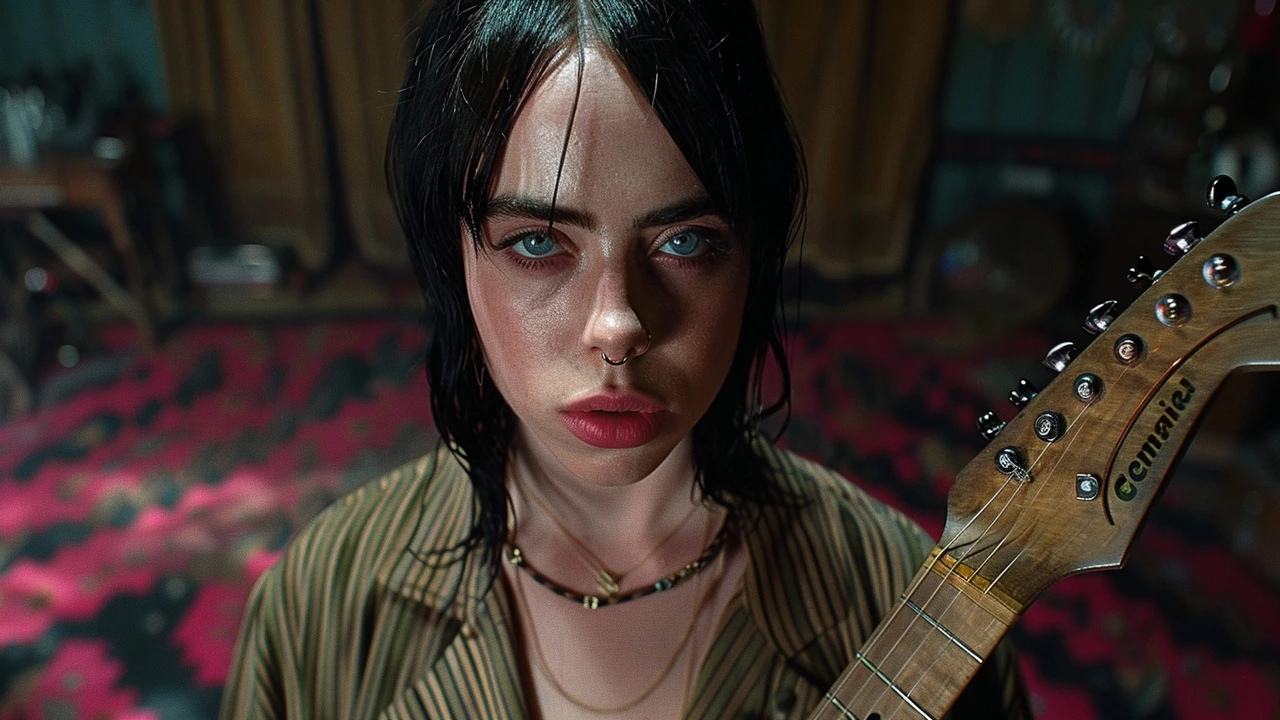Billie Eilish Opens Up About Devastating Ghosting Experience and Loneliness in Fame

Billie Eilish Shares Her Painful Experience of Being Ghosted by a Long-Time Friend
In a heartfelt conversation on the *Miss Me?* podcast, 22-year-old singer-songwriter Billie Eilish opened up about a deeply personal experience that left her feeling bewildered and heartbroken. Speaking with hosts Lily Allen and Miquita Oliver, Eilish recounted how a man she had known for years abruptly cut off all contact with her in December. This event unfolded just after the two had made plans together, adding an unexpected sting to the abandonment. Eilish expressed her shock, saying she 'genuinely didn't know people did that,' highlighting her disbelief at the sudden turn of events.
The incident profoundly affected Eilish, not only because of the sudden nature of the ghosting but also because of what she later discovered about her friend. She found out he had started dating someone else, which only added to her sense of betrayal and confusion. This revelation marked a stark contrast to the friendship she thought they had, forcing her to confront the painful reality of the situation.

The Isolation of Fame
Eilish didn’t stop there; she went on to reveal how this was not the first time she had felt such a profound sense of isolation. Reflecting on her rise to fame at the tender age of 17, following the release of her debut album *When We All Fall Asleep, Where Do We Go?*, Eilish recounted how she lost nearly all her friends, except one named Zoe. The sudden shift from a relatively normal teenage life to global stardom was not just overwhelming but also alienating. She felt an acute sense of loneliness, unable to relate to anyone around her.
The pressure to maintain relationships while juggling newfound fame and a busy career proved to be a Herculean task. Even when she attempted to reconnect with old friends after returning from her tour, she encountered resentment and difficulty in re-establishing those bonds. The disconnect was palpable, creating a chasm that seemed insurmountable.
The Realization of Being Surrounded by Employees
Adding another layer to her feelings of isolation, Eilish shared a poignant moment from her 20th birthday. Surrounded by people who were supposed to be her friends, she had a stark realization: many of them were, in fact, her employees. This stark awareness brought on a wave of loneliness, highlighting the complex nature of her relationships. The blurred lines between professional and personal life made it challenging for her to find genuine companionship.
Her candid recounting of these experiences sheds light on the often hidden struggles that come with fame. Despite her immense success, Eilish's story serves as a poignant reminder that even those in the spotlight are not immune to the emotional challenges that everyone faces. The loneliness and betrayal she felt are universal experiences, resonating deeply with many of her listeners.

Connecting with Her Audience
Billie Eilish’s willingness to share such personal stories on the podcast has allowed her to connect with her audience on a profoundly empathetic level. By opening up about her struggles, she provides a voice to those who may be going through similar experiences. It’s a reminder of the importance of empathy and understanding in a world that often values success and fame over genuine human connection.
The podcast *Miss Me?*, available on BBC Sounds every Monday and Thursday, offers a platform for such heartfelt discussions, giving audience members a glimpse into the personal lives of their favorite celebrities. Eilish's episode is a testament to the power of sharing personal stories and the impact it can have on fostering a sense of community and mutual understanding.
In conclusion, Billie Eilish’s candid revelations about being ghosted by a long-time friend and the isolation she felt during her early fame highlight the complexities of human relationships and the emotional challenges that come with success. Her story serves as a reminder that it’s essential to prioritize meaningful connections and empathy in our interactions, reinforcing the idea that genuine human connection is invaluable.
15 Comments
Naveen Kumar Lokanatha
Thank you for sharing, Billie. It’s essential to recognize that even those with massive platforms can feel isolated, and discussing such hardships can help normalize mental‑health conversations. Your honesty may empower others to seek connection and set boundaries.
Alastair Moreton
I’ve seen similar patterns when people treat celebrities like disposable acquaintances.
Surya Shrestha
One must contemplate the sociocultural ramifications of celebrity isolation, a phenomenon that, while ostensibly trivial, elucidates the pervasive commodification of personal relationships; indeed, the veneer of fame often obscures the authentic human yearning for reciprocity. The abrupt cessation of communication, colloquially termed “ghosting,” serves as a microcosm of contemporary relational disintegration, wherein digital ephemerality supplants sustained engagement. Moreover, the juxtaposition of public adulation against private abandonment engenders a paradoxical dialectic, compelling the individual to navigate an existential dichotomy. Such experiences, when articulated with candor, dissolve the mythos of invulnerability that pervades popular discourse. Consequently, the narrative invites a critical reassessment of our collective expectations surrounding fame and intimacy.
Rahul kumar
Sounds rough, but you can turn it into growth. Try setting clear boundaries with people and lean on a small circle that respects you. Also, journaling your feelings helps keep the noise at bay.
mary oconnell
Ah, the age‑old paradox of fame: you’re simultaneously an object of worship and a victim of social neglect. The cognitive dissonance experienced when a “friend” vanishes is, frankly, a textbook case of relational entropy. Yet, in the grand schema of celebrity culture, such betrayals are statistically inevitable, so congratulations on achieving the milestone. If nothing else, your transparency adds a valuable data point to the ongoing discourse on fame‑induced loneliness.
Michael Laffitte
Wow, that hit deep-feels like the universe just put a spotlight on the lonely side of stardom. I’m here for the roller‑coaster ride, and I’ll keep cheering you on.
sahil jain
Love that you’re opening up about this-it’s a huge step toward healing! 😊
Bruce Moncrieff
It’s amazing how sharing these experiences can spark a ripple effect of empathy across fans and fellow artists alike. Keep leaning into your voice, because it not only heals you but also lights the way for others navigating similar storms.
Dee Boyd
While the sentiment is noble, one must also acknowledge the ethical implications of commodifying personal trauma for public consumption; the line between authenticity and exploitation can become dangerously blurred.
Carol Wild
The modern celebrity ecosystem operates like a carefully engineered spectacle. Behind the glossy headlines lies a network of power brokers who manipulate personal narratives for profit. When a star like Billie Eilish reveals personal pain, the media seizes the moment to reinforce a manufactured image of vulnerability. This cycle perpetuates a feedback loop where audiences are fed curated suffering, which in turn fuels the industry’s revenue streams. The practice of ghosting, while seemingly interpersonal, is co‑opted by publicists as a strategic withdrawal to generate buzz. Moreover, the sudden “friend disappears” trope dovetails neatly with the sensationalist agenda of click‑bait platforms. One could argue that the very concept of genuine friendship has been diluted by contractual obligations and branding considerations. The pervasive surveillance culture ensures that every micro‑interaction is logged, analyzed, and weaponized against the individual. In this environment, loneliness becomes a marketable commodity rather than a private struggle. The fact that Billie’s 20th birthday was surrounded by employees masquerading as friends exemplifies the blurring of professional and personal spheres typical of the entertainment machine. Some observers maintain that an unseen syndicate of industry executives orchestrates such scenarios to keep artists dependent on their support systems. This hypothesis, while sounding conspiratorial, aligns with documented cases of talent agencies controlling personal relationships. Consequently, the public’s empathy may be inadvertently redirected to serve corporate interests rather than authentic human connection. The ultimate tragedy lies not in the ghosting itself but in the systemic forces that normalize emotional exploitation. Recognizing these patterns is the first step toward reclaiming agency over one’s own narrative.
Rahul Sharma
Indeed, the structural dynamics you outline merit rigorous scrutiny; however, it is incumbent upon us to also celebrate the agency individuals like Billie exhibit when they break those very molds.
Emily Kadanec
Actually, the psychological impact of ghosting has been documented since the early 2000s.
william wijaya
Your openness shines a light on how pervasive emotional dysregulation can be in high‑visibility careers, and it reminds us that mental health support should be integrated into industry standards.
Lemuel Belleza
While it’s a nice sentiment, we’ve all heard this before and it doesn’t add new insight.
faye ambit
In reflecting on this narrative, we might consider that authentic connection arises not from fame or its absence, but from the willingness to be vulnerably present with one another.

Write a comment